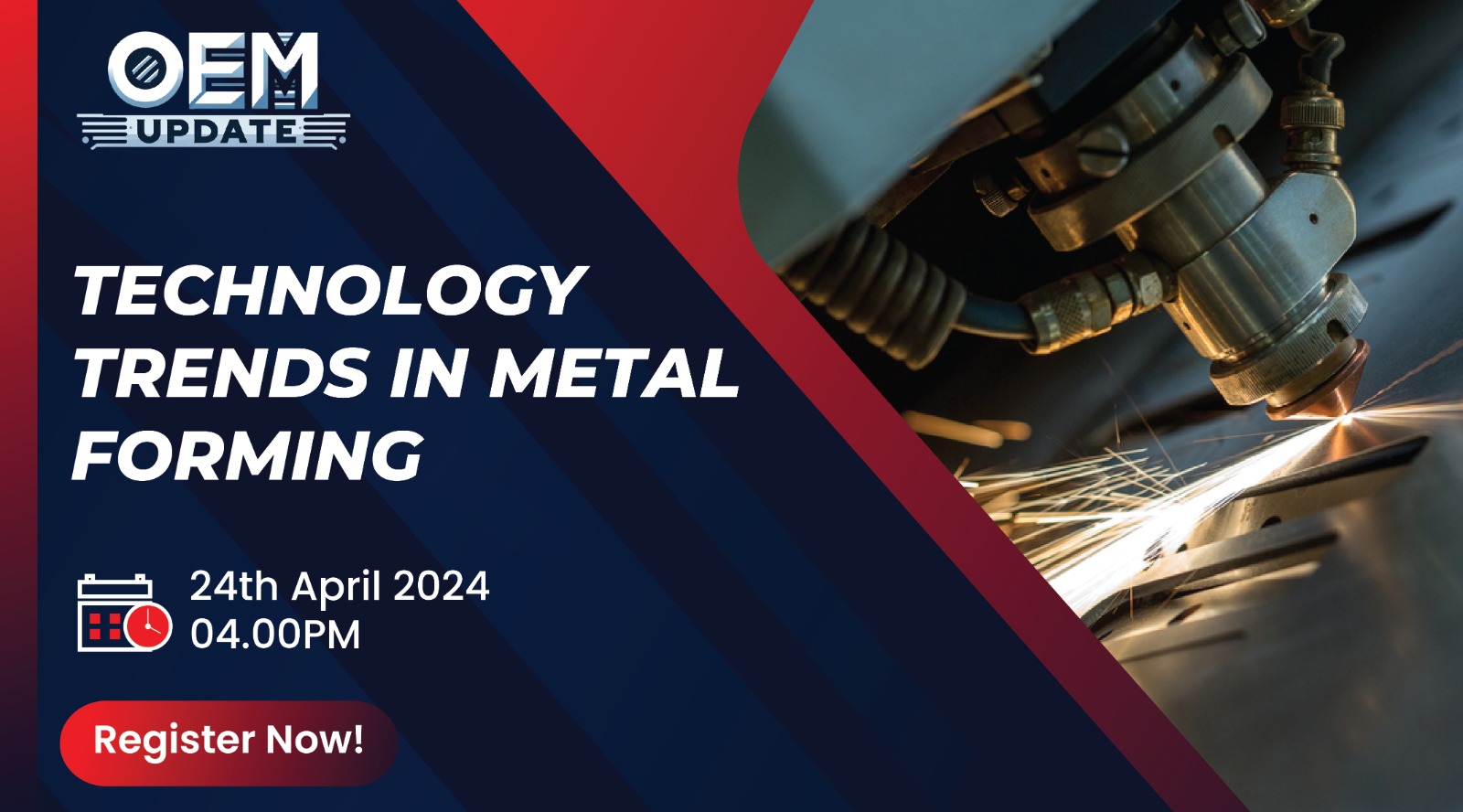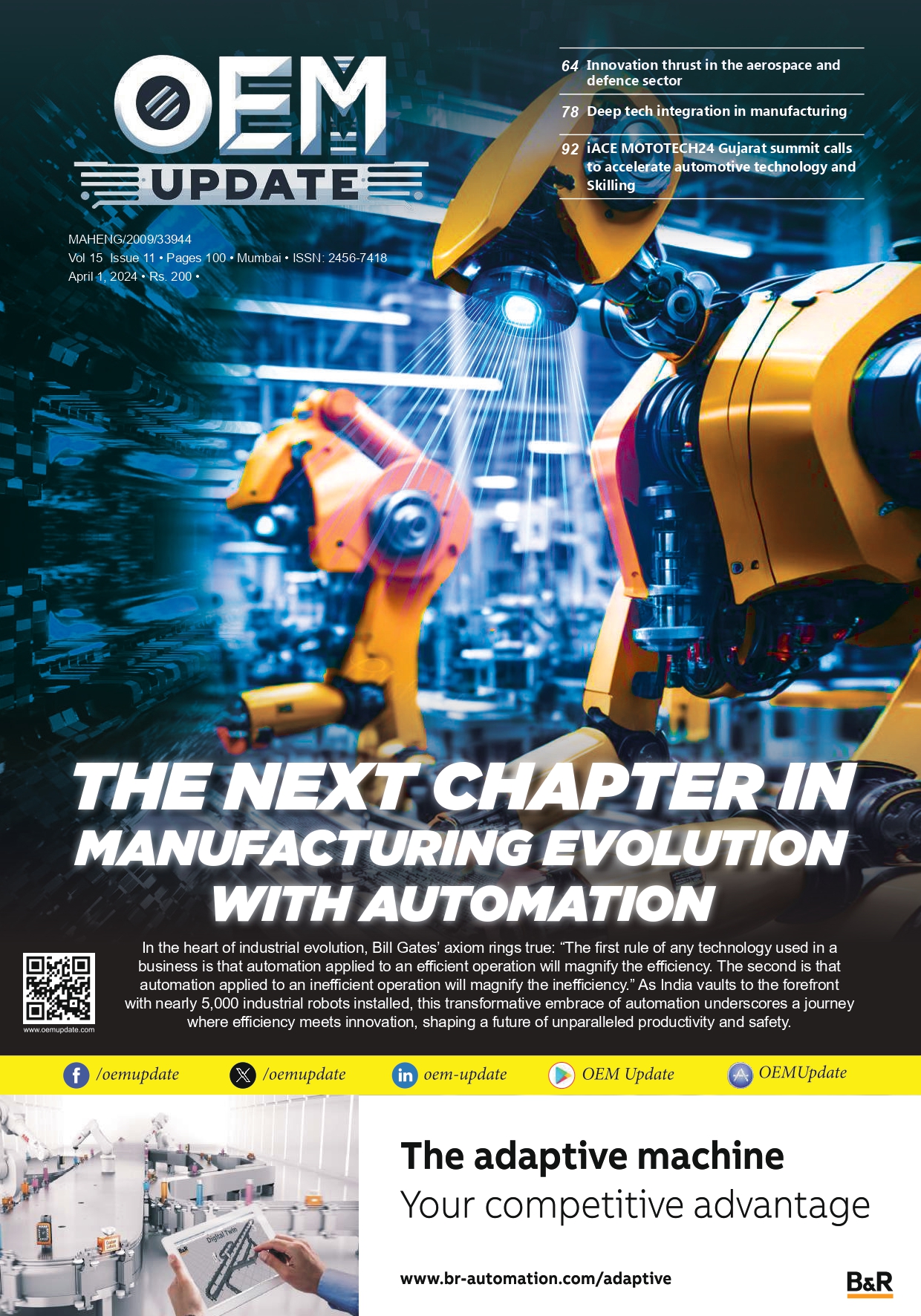Industry 4.0: Is industrial automation ready to leapfrog?
August 13, 2018 2:55 pm
The Industrial 4.0 represents a revolution in the manufacturing processes based on new technologies and innovative concepts. Here’s an in-depth analysis on how important is the role of automation in Industrial Revolution 4.0.
A concept born in Germany in 2010, Industry 4.0 refers to the fourth industrial revolution being felt around the world. It covers technology innovations such as automation, the Internet of Things (IoT) and Artificial Intelligence (AI), which respond to three key issues: greater competitiveness of assets, flexibility in response to demand and the regionalisation of production. The majority of industrialised countries have started the transition to Industry 4.0 to respond to these challenges and prosper.
Role of automation in Industrial Revolution 4.0
Dramatic change in manufacturing processes
Varun Arora, National Sales Manager, Exor India Pvt Ltd feels, “As physical and digital worlds merge, manufacturing processes will change dramatically in the Industry 4.0, that’s for sure.” Today’s emerging technologies will have a similar effect on our society as water power and steam engines had at the end of the 19th century (and the succeeding technology waves that enabled mass production and automation in the 20th century).”
He adds, “Traditional ‘mechanical chains’ in production are being transformed into ‘digital chains.’ This will make many traditional production and logistic processes obsolete. Smart items are another key technology. In 2020, billions of devices will be connected to the internet. A good share of them will be part of the production process. Equipped with sensors and actuators, products, tools, and machines will provide a digital shade of all kinds of activities and means for faster decision making and control. Plant managers get real-time insights from the shop floor and immediate control of production processes. The use of smart items will enable more flexible and autonomous manufacturing units.”
Aspects of Industry 4.0
Automation is the enabler for industrial revolutions, similar to all previous industrial revolutions. It plays a central role for any machine builder or factory on their path to a successful Industry 4.0 implementation. However, there are many more aspects of Industry 4.0 such as encapsulating supply chain, vendors, power grids, collaborations at all levels and much more. Ninad Deshpande, Head- Marketing, B&R Industrial Automation explains, “Manufacturing units, factories and vendors are focusing on automation, providing a boost for industrial automation as a core of Industry 4.0. Automation is the heart of these systems. Even while considering upgrading existing setups to become smart, automation holds the key. With digitisation, automation has a much wider reach moving from the shop floor to the IT and cloud. In this industrial revolution, sensors, machines, factories and IT systems will be connected along the value chain beyond a single enterprise. These connected cyber-physical systems can interact with one another using standard protocols and analyse data to predict failure, configure themselves and adapt to changes.”
Digitisation will make it possible to gather and analyse data across machines and factories enabling flexible and efficient processes to manufacture higher-quality goods cost-effectively. Deshpande informs, “Today, the connected factory has every element automated and smart. It is important to understand that automation vendors will be able to provide solutions and technologies for moving on the path of Industry 4.0. We will help manufacturers and factories to be ready for the future, helping them build ‘factories of the future’ and helping machine builders build machines with next generation automation solutions.”
Subsystems are networked and consolidated into one system
The convergence of information technology and operational technology has created a paradigm shift resulting in the fourth industrial revolution. The impact promises to grow and be even more substantial as manufacturers and their suppliers deploy and integrate more technologies across the entire manufacturing chain. Meenu Singhal, VP Industry Business, Schneider Electric India states, “In the ‘factory of the future’, Information and Communication Technology (ICT) and automation technology are fully integrated. All subsystems including non-producing ones such as R&D as well as sales partners, suppliers, OEMs and customers are networked and consolidated into one system. This makes it possible to simulate the results in full by simply changing the parameters. The digitalisation, automation and networking of processes encompasses all functions, areas and segments of the manufacturing industry including economic (and macro social) action.”
Automation provides opportunities
Manufacturing industry had been the first to embrace automation as it solved many of the issues related to operational and business efficiencies. Amit Tiwari, Marketing Manager, WAGO Pvt Ltd. opines, “While businesses have largely rationalised and standardised their production processes, there is a clear need to make these processes efficient enough for scaling the operations to respond to uncontrollable external variables. This requires continuous flow of operational information for suitable business decision making. Automation has provided this opportunity to stream, compile and convert the plant level data into meaningful insights that in turn provide solution to the challenges of demand vs. supply, project management, machine operations and system usability.”
He adds, “The fourth industrial revolution marks the advent of technology fusion where different sets of digital technologies including cyber-physical systems, cloud computing and cognitive computing logically integrate to deliver more efficient and sustainable processes. Smart production enabled by automated processes ensures flexibility in operations, efficient work streams and greater alignment with business strategy.”
Implementing Industry 4.0 in manufacturing process
Ajey Phatak, Head Marketing, Beckhoff Automation Pvt. Ltd. observers, “In today’s market, the consumers have multiple options or sources to buy from. The consumer also has variety of price options. They also get products as and when they need them. They have global market access. In such scenario, manufacturers are compelled to accept product customisation and also produce it profitably. That also means manufacturers must have highest efficiency and should have machine assets that can produce products with variations. Managing the assets with minimal down time means more profitability. Hence, it is becoming imperative to implement IoT or Industry 4.0 concept in manufacturing.”
Industry 4.0: Revolution in work organisation
Industry 4.0 is an amalgamation of varied technologies such as IIoT, advanced robotics, Artificial Intelligence, additive and digital manufacturing, computational power, 3D Printing, augmented reality, agile product development, etc. In order to utilise them in the most effective and customised manner suiting the current and future needs of the shop floors, the makers need to nurture and evolve in an ecosystem comprising of the right and desired level of technological know-how and support. They need an end-to-end integrated way ahead right from the stage of conceptualisation to execution and maintenance. Hence, one can say that it is imperative to a great extent.
With extensive support pouring in from industry specific national level initiatives such as ‘Make in India’, the manufacturing industry is facing an interesting time which is quite different from what existed a few years ago. Sameer Gandhi, MD, OMRON Automation India feels, “The work environment and its dynamics are more globalised in nature now. Movement of goods and services and even ideas are happening at a much faster pace across the international borders, today, than any time before. So, even though an organisation is manufacturing in India, it has to manufacture for the world meeting the global standards. An organisation may have no intentions of exporting its produce but it has to compete with the global products and world-class manufacturers because the global product is going to compete with their products on the Indian market shelf. Hence, for world-class manufacturing, the makers have to invest in world-class automation which includes newer technologies such as IoT or Industry 4.0.”
Automation defines Industrial Revolution 4.0
Manish Walia, Head- Industrial Automation Business Group, Delta Electronics India Pvt. Ltd states, “With Industrial Revolution 4.0 attaining a deeper grip on the industrial framework, the focus has shifted to smart production, digitalisation, easy information access and circulation. It is the transformation that makes it possible to gather and analyse data across machines, enabling faster, more flexible, and more efficient processes to produce higher-quality goods by exploitation of potentials of new technologies. Automation is the key driver and will permanently change the ways businesses engage with customers. It will not just accelerate the digital transformation but will improve productivity by helping in customisation to meet consumers’ expectations and drive continuous product innovation while consistently lowering costs.”
Additive advantage for automation and a lucrative investment destination by other countries
Technology advancements: Profitable and efficient
Deshpande says, “In the context of the new industrial revolution, machine builders and factories are turning towards open source architectures and moving away from proprietary solutions to handle the rapid and asynchronous new developments in fields such as processors, connectivity, mechatronics, Artificial Intelligence and enhanced reality. Openness also forms the core of Industry 4.0. Robotics and automation are no longer a good to have, but a ‘must-have’ in Indian manufacturing. Thus, Industry 4.0, globally or in India, is an additive advantage for automation. Converting data to valuable information with analytics provide the business insight to management across factories. It helps them understand the processes in detail, enabling them to have a holistic view of the factories. This helps them to optimise factory operations, monitor assets and much more. These technology advancements help them become more profitable and efficient.”
In addition, with RPA, one question always pops up – what about jobs? However, jobs are not at stake at all with RPA. It is important that how much ever one refuses, the current set of jobs is set to reduce. However, these new technologies and systems bring in with them ample opportunity for newer job profiles needing new skillsets. Thus, re-skilling plays an important role for aiding jobs and further increasing the jobs. Deshpande opines “In addition, technology will keep improving and new technologies will further rise and create further new opportunities. Re-skilling is the only solution playing a major role in helping manufacturing adopts such technological advances.”
MNCs and professional Indian companies to led Industry 4.0
Industry 4.0 enables Indian manufacturers to not only be cost competitive but also enable access to developed markets through technologically advanced products. Singhal states, “The Government of India envisages to increase the contribution of manufacturing from around 15-25 per cent of GDP by 2022 under the ‘National Manufacturing Policy’ (NMP). ‘Make in India’ initiative has already positioned India as a global manufacturing hub and has opened its resources for companies to set up production base in the country. This has demanded the Indian manufacturers to adopt advanced manufacturing processes to ensure the success of ‘Make in India’ initiative. Currently, the adoption is only seen in 10 per cent of companies and 80 per cent is expected to be adopted by 2020. Industry 4.0 is expected to be led by MNCs and large professionally managed Indian companies.”
Amplifying the role of automation
Since the beginning of current century, we have seen an unprecedented influx of global companies setting up their businesses in India. Increasing income levels, huge potential customer base and lower cost of production are the primary drivers for these investments. Need for agile production, optimum supply chain, standardisation and profitability have prompted these organisations to automate their systems and processes. Introduction and availability of data driven decision making has also amplified the role of automation in manufacturing industry.
Arora says, “Under the new initiatives by the Government of India such as ‘Make in India’, ‘Digital India’ and ease of doing business, this definitely presents a big opportunity to become a favoured manufacturing and investment destination for other countries. We all know that we still lag behind the developed countries as far as industrial automation is concerned, so there lays a big gap and this gap should be utilised as opportunity for growth of local industries.”
• New processes
The government is introducing several reforms to create possibilities for getting Foreign Direct Investment (FDI) and foster business partnerships. Some initiatives have already been undertaken to alleviate the business environment from outdated policies and regulations. This reform is also aligned with parameters of World Bank’s ‘Ease of Doing Business’ index to improve India’s ranking on it.
• New infrastructure
Infrastructure is integral to the growth of any industry. The government intends to develop industrial corridors and build smart cities with state-of-the-art technology and high-speed communication. Innovation and research activities are supported by a fast-paced registration system and improved infrastructure for Intellectual Property Rights (IPR) registrations. Along with the development of infrastructure, the training for the skilled workforce for the sectors is also being addressed.
• New sectors
‘Make in India’ has identified 25 sectors to promote with the detailed information being shared through an interactive web-portal. The government has allowed 100 per cent FDI in railwayand removed restrictions in construction. It has also recently increased the cap of FDI to 100 per cent in defense and pharmaceutical.
• New mindset
Government in India has always been seen as a regulator and not a facilitator. This initiative intends to change this by bringing a paradigm shift in the way government interacts with various industries. It will focus on acting as a partner in the economic development of the country alongside the corporate sector.
Investing in control technology
Phatak suggest, “Indian manufacturers must address their own individual challenges rather than following the footsteps of developed nations. Indian manufacturers must invest in control technology that will help them implement Industry 4.0 concept. This investment will have its own return on investment (RoI). Hence, the investment should not be considered as cost. O&M department must think of bringing zero downtime in their manufacturing using predictive maintenance. This requires real time data sharing by machines and equipment.”
A great opportunity
Gandhi opines, “It is a great opportunity for automation players to help the manufacturers match the pace with the evolving trends and also contribute towards enhancing India’s brand equity and value as a preferred destination for manufacturing at a global level.”
Digital India: Digitally empowered society and knowledge economy
Industrial revolution is emerging globally as a powerful force as it is characterised by the increasing digitisation making products interlinked and contributing immensely to value chains and businesses. With amalgamation of emerging technologies such as Big Data, IoT, business analytics, augmented reality, Artificial Intelligence, elemental design, advanced robotics, additive manufacturing, sensor-based technologies, cyber-physical systems etc. it is bringing around versatility and resource efficiency in businesses.
Walia says, “Industry 4.0,which is in sync with the Government of India’s Digital India programme, will help fulfil the vision to transform India into a digitally empowered society and knowledge economy. This makes India uniquely advantaged in scalable digital technologies which is undoubtedly an advantage. Industry 4.0 is a leapfrog opportunity for India to become hopefully the first large economy in the digital 21st century. This use of test and measurement automation and robotic technology is sharpening the competitive edge for leading technology companies. The investment into these new innovations will help safeguard and strengthen a company’s future in the global market place.”
Traditional ‘mechanical chains’ in production are being transformed into ‘digital chains’.
Varun Arora, National Sales Manager, Exor India Pvt Ltd
Manufacturing units, factories and vendors are focusing on automation, providing a boost for industrial automation as a core of Industry 4.0.”
Meenu Singhal, VP Industry Business, Schneider Electric India
The digitalisation, automation and networking of processes encompasses all functions, areas and segments of the manufacturing industry – including economic (and macro social) action.
Amit Tiwari, Marketing Manager, WAGO Pvt Ltd
It is becoming imperative to implement IoT or Industry 4.0 concept in manufacturing.
Ajey Phatak, Head Marketing, Beckhoff Automation Pvt Ltd
For world-class manufacturing, the makers have to invest in world-class automation which includes newer technologies like IoT or Industry 4.0.
Sameer Gandhi, MD, Omron Automation India
Industry 4.0 is a leapfrog opportunity for India to become hopefully the first large economy in the digital 21st century.
Manish Walia, Head- Industrial Automation Business Group, Delta Electronics India Pvt. Ltd
Cookie Consent
We use cookies to personalize your experience. By continuing to visit this website you agree to our Terms & Conditions, Privacy Policy and Cookie Policy.
















